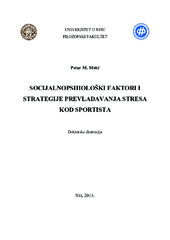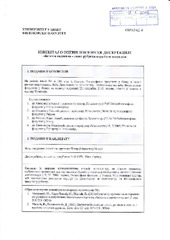Приказ основних података о дисертацији
Socijalnopsihološki faktori i strategije prevladavanja stresa kod sportista
| dc.contributor.advisor | Kostić, Aleksandra | |
| dc.contributor.other | Takšić, Vladimir | |
| dc.contributor.other | Hadži-Pešić, Marina | |
| dc.contributor.other | Milojević, Aleksandar | |
| dc.creator | Mitić, Petar | |
| dc.date.accessioned | 2016-07-23T16:21:06Z | |
| dc.date.available | 2016-07-23T16:21:06Z | |
| dc.date.available | 2020-07-03T16:18:04Z | |
| dc.date.issued | 2016-04-11 | |
| dc.identifier.uri | http://eteze.ni.ac.rs/application/showtheses?thesesId=3359 | |
| dc.identifier.uri | https://nardus.mpn.gov.rs/handle/123456789/6049 | |
| dc.identifier.uri | https://fedorani.ni.ac.rs/fedora/get/o:1103/bdef:Content/download | |
| dc.identifier.uri | http://vbs.rs/scripts/cobiss?command=DISPLAY&base=70052&RID=1545214975 | |
| dc.description.abstract | The objective of this research was to examine and determine the degree of the specific stress coping strategies used by athletes; to determine if there are any differences in the prevalence of the specific strategies used for coping with stressful situations between more successful athletes, less successful athletes and non-athletes; and to determine whether at all, and to what extent, the prevalence of using different stress coping strategies is related to the notions of emotional competence, self-efficacy, dominant time perspective, achievement motivation and personality traits. Furthermore, one of the research objectives was to examine whether success in sports, not going in for sports, the type of sport one goes in for and the gender of the athlete play any moderator role in the correlation between emotional intelligence, selfefficacy, dominant time perspective, achievement motivation and personality traits, on one hand, and using different stress coping strategies, on the other hand. One general and seven specific hypotheses were defined based on these objectives. The hypotheses were verified on different examinee subsamples. The overall number of the examinees who took part in this research was 509 (340 athletes, 171 of whom belong to the subsample of more successful athletes, 169 to less successful athletes and 169 to the subsample of non-athletes). The research variables were adequately operationalised. The statistical techniques used for analysing the data were: the Pearson correlation coefficient, the t-test for independent samples, linear and hierarchical regression analysis (moderated multiple regression analysis). The most significant results obtained by this research are as follows: More successful athletes reveal statistical significance in the usage of problem-focused coping strategies in relation to less successful athletes; and an identical relation is revealed between athletes and non-athletes. Athletes in team sports are more prone to use avoidant coping strategies, just as women do in relation to men. Emotional intelligence, achievement motivation, self-efficacy, personality traits, conscientiousness and openness, are in a statistically significant and positive correlation to problem-focused strategies. Regarding the moderator effects that success in sport, type of sport, (not)going in for sports and gender have on the correlation between specific stress coping strategies and sociopsychological factors, the following conclusions may be reached: A) Success moderates the correlation between the emotion-focused strategy and self-efficacy, the correlation between the avoidant coping strategy and governing emotions, and the correlation between distraction as a coping strategy and governing emotions. B) Going in for sports moderates the correlation between avoidance and extraversions. C) The type of sport moderates the correlation between the problem-focused strategy and extraversion, between emotionality and social diversion, extraversion and social diversion. D) Gender moderates the correlation between conscientiousness and the problem-focused strategy, and the correlation between self-efficacy and the problem-focused strategy. | en |
| dc.format | application/pdf | |
| dc.language | sr | |
| dc.publisher | Универзитет у Нишу, Филозофски факултет | sr |
| dc.rights | openAccess | en |
| dc.rights.uri | https://creativecommons.org/licenses/by-nc-nd/4.0/ | |
| dc.source | Универзитет у Нишу | sr |
| dc.subject | stres | sr |
| dc.subject | stress | en |
| dc.subject | prevladavanje | sr |
| dc.subject | sportisti | sr |
| dc.subject | socijalno psihološki faktori | sr |
| dc.subject | coping | en |
| dc.subject | athletes | en |
| dc.subject | socio-psychological factors | en |
| dc.title | Socijalnopsihološki faktori i strategije prevladavanja stresa kod sportista | sr |
| dc.type | doctoralThesis | en |
| dc.rights.license | BY-NC-ND | |
| dcterms.abstract | Костић, Aлександра; Хаджи-Пешић, Марина; Милојевић, Aлександар; Такшић, Владимир; Митић, Петар; Социјалнопсихолошки фактори и стратегије превладавања стреса код спортиста; Социјалнопсихолошки фактори и стратегије превладавања стреса код спортиста; | |
| dc.identifier.fulltext | https://nardus.mpn.gov.rs/bitstream/id/55392/Disertacija3990.pdf | |
| dc.identifier.fulltext | https://nardus.mpn.gov.rs/bitstream/id/55393/Mitic_Petar.pdf | |
| dc.identifier.fulltext | http://nardus.mpn.gov.rs/bitstream/id/55392/Disertacija3990.pdf | |
| dc.identifier.fulltext | http://nardus.mpn.gov.rs/bitstream/id/55393/Mitic_Petar.pdf | |
| dc.identifier.rcub | https://hdl.handle.net/21.15107/rcub_nardus_6049 |



